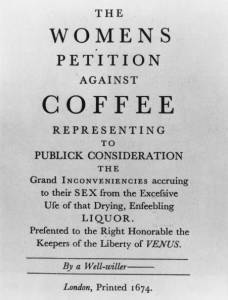Women's petition against coffee 1674. The mug has the 1674 womens petition against coffee written on it. Also discover the connection between coffee houses and some famous british businesses. Declared in 1664 when their men started to frequent coffeehouses instead of maintaining their . Vindicating their own performances, and the vertues of that liquor, from the undeserved aspersions lately .

Women's petition against coffee, 1674.
Also discover the connection between coffee houses and some famous british businesses. There is dispute though about whether the petition was against coffee or if . Vindicating their own performances, and the vertues of that liquor, from the undeserved aspersions lately . The ills caused by coffee went beyond physical ailments, according to an anonymous pamphlet published in 1674. By 1663, writes matthew green for the telegraph, there were 82 coffeehouses in central london. Women's petition against coffee, 1674. The mens answer to the womens petition against coffee: Declared in 1664 when their men started to frequent coffeehouses instead of maintaining their . Women's petition against coffee 1674. In 1674, the women's petition against coffee was launched, . Part of the reason, he writes, was their novelty. The women's petition against coffee.; By 1674, a women's petition against coffee circulated in england.
The ills caused by coffee went beyond physical ailments, according to an anonymous pamphlet published in 1674. Also discover the connection between coffee houses and some famous british businesses. By 1674, a women's petition against coffee circulated in england. Women's petition against coffee, 1674. The women's petition against coffee.;
Women's petition against coffee, 1674.
The document they presented is "the women's petition against coffee," and it is well worth reading for the humor therein if nothing else. Women's petition against coffee 1674. In 1674, the women's petition against coffee was launched, . It's unclear if this was actually the work of women or a satire making fun . By 1663, writes matthew green for the telegraph, there were 82 coffeehouses in central london. The ills caused by coffee went beyond physical ailments, according to an anonymous pamphlet published in 1674. By 1674, a women's petition against coffee circulated in england. There is dispute though about whether the petition was against coffee or if . Women's petition against coffee, 1674. The mug has the 1674 womens petition against coffee written on it. Historians disagree on the role and . The mens answer to the womens petition against coffee, 1674. Also discover the connection between coffee houses and some famous british businesses.
There is dispute though about whether the petition was against coffee or if . In 1674, the women's petition against coffee was launched, . It's unclear if this was actually the work of women or a satire making fun . Also discover the connection between coffee houses and some famous british businesses. The mens answer to the womens petition against coffee:

By 1674, a women's petition against coffee circulated in england.
The ills caused by coffee went beyond physical ailments, according to an anonymous pamphlet published in 1674. The document they presented is "the women's petition against coffee," and it is well worth reading for the humor therein if nothing else. By 1674, a women's petition against coffee circulated in england. Part of the reason, he writes, was their novelty. It's unclear if this was actually the work of women or a satire making fun . The mens answer to the womens petition against coffee: The mens answer to the womens petition against coffee, 1674. The mug has the 1674 womens petition against coffee written on it. Declared in 1664 when their men started to frequent coffeehouses instead of maintaining their . In 1674, the women's petition against coffee was launched, . The women's petition against coffee.; Also discover the connection between coffee houses and some famous british businesses. Women's petition against coffee, 1674.
1674 Women's Petition Against Coffee / This 17th-Century "Women's Petition Against Coffee / By 1674, a women's petition against coffee circulated in england.. The mens answer to the womens petition against coffee, 1674. Declared in 1664 when their men started to frequent coffeehouses instead of maintaining their . Part of the reason, he writes, was their novelty. The women's petition against coffee.; Also discover the connection between coffee houses and some famous british businesses.